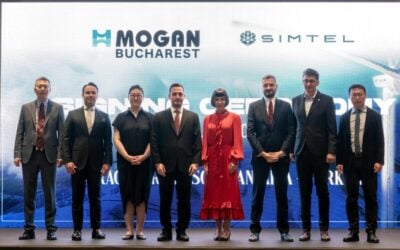
The European Union parliament has voted on amendments to REPowerEU which will see its accelerated permitting for renewable projects expanded to include standalone energy storage.
The REPowerEU strategy was written up in response to Russia’s invasion of Ukraine earlier this year and saw the bloc increase its renewables deployments target to 2030 in an effort to strengthen energy security. Part of this was implementing new, accelerated permitting rules for renewable projects, but until now only co-located energy storage was included.
Enjoy 12 months of exclusive analysis
- Regular insight and analysis of the industry’s biggest developments
- In-depth interviews with the industry’s leading figures
- Annual digital subscription to the PV Tech Power journal
- Discounts on Solar Media’s portfolio of events, in-person and virtual
Yesterday (14 December), the European Parliament in a plenary session voted on new REPowerEU amendments to the Renewable Energy, Energy Performance of Buildings and Energy Efficiency Directives which will see the accelerated permitting extended to all energy storage, standalone or co-located. Previously, it only mentioned co-located energy storage.
The directive now reads: “The permit-granting process shall cover all relevant administrative permits to
build, repower and operate plants for the production of energy from renewable sources including hybrid power plants that combine different renewable energy sources, heat pumps, energy storage, including power and thermal facilities, as well as assets necessary for their connection to the grid and to
integrate renewables into heating and cooling networks.”
“It shall also include related energy networks permits and environmental assessments where these are
required.”
The amendments voted on by the Parliament include a weakening of environmental assessment rules, which was criticised by the WWF (World Wide Fund for Nature).
The The European Association for Storage of Energy (EASE) on the other hand praised the amendments, saying:
“Setting clear timelines and developing better provisions on permitting for energy storage will render it even more attractive to investors and accelerate its deployment. EASE fully agrees that energy storage should be presumed to be in the overriding public interest in all permitting procedures.”
The news follows hot on the heels of the Parliament and European Council provisionally agreeing more stringent rules on battery sustainability, performance and labelling, as reported by Energy-Storage.news.
Alongside top-level policy moves, the EU has also been supporting energy storage deployments at the country-level through partially bloc-funded state aid for various projects, including most recently in Finland – both pumped hydro and co-located battery storage there – Romania and Greece.
Energy-Storage.news’ publisher Solar Media will host the eighth annual Energy Storage Summit EU in London, 22-23 February 2023. This year it is moving to a larger venue, bringing together Europe’s leading investors, policymakers, developers, utilities, energy buyers and service providers all in one place. Visit the official site for more info.






